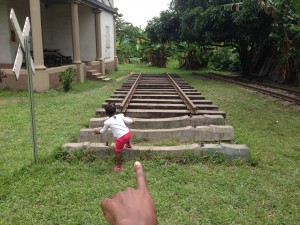In the twenty years that have passed since the Beijing Conference, I have gone from being a girl child myself to having one of my own. At first, I was told I was having a boy, and when I found out I wasn’t, my heart started to ache for my unborn child because of all the pain I could see waiting for her in the world. In my own twenty years prior to falling pregnant (I was barely 21 when I gave birth), I had experienced enough gendered violence to realistically believe that she might have only five or six years before she became ‘fair game’. As it turned out, she only had two.
The first time a stranger called out a sexual comment to my daughter, she was one week shy of her second birthday. My shock and anger were useless, as the man laughed with his friends, insisting they were ‘just joking with the baby.’ I had always been aware that there was only so much I would be able to protect my little girl from, but it was never more real to me than that day.
Already I’ve seen her shoulders slump under the weight of gendered expectations, as people ask her to ‘act like a girl’ whenever she plays loudly, insisting, “don’t you know you have to be a lady?”. I’ve watched her blithely ignore jokes that she will find a husband quickly because of the size of her bum, seen her internalise reminders not to fall down too often because scars will reduce her bride price… She’s barely two, but already the scope of her life is starting to be limited by her gender, and her value as a person has started to be measured by her marriageability and ability to perform femininity.
My daughter and girls like her are the reason I am unapologetic about my feminism. Progress has been made in the last twenty years, but there is still a lot of work to be done. Girls and women are so much more than mere vehicles for men’s sexual expression or bargaining tools in power struggles, and the sooner we collectively recognise this, the better. Government policies actively exclude, dismiss or erase women. In the classroom and the boardroom, our femaleness invariably places us at a disadvantage. Less than 2% of all aid money goes to girls, despite the vast amounts of evidence that show that the empowerment of young girls is the key to maximising nations’ economic potential.
For every girl who drops out of school to work, get married or care for ill relatives, there is a generation disenfranchised. For every girl kidnapped or trafficked into slavery of any kind, a nation loses out. Every time a girl or woman dies in childbirth, from malnourishment, from easily preventable diseases or lack of primary healthcare, the loss is far greater than simply one dead citizen. We all lose out when girls and women are given the short end of the stick — we have all been losing out for a long time.
Feminism has enjoyed a surge in popularity in recent years, thanks in part to pop culture icons and members of the mainstream adopting either the ideology itself or espousing its tenets. With the democratisation of knowledge via the internet, there is now increased awareness of the issues affecting women – poverty, violence, unemployment and other kinds of disenfranchisement — and more than ever before we have the tools, if not all of the resources, necessary to get everyone on board in the fight.
The fact remains that if women’s rights continue to be treated as being relevant only to women, our progress will be slow. Women’s issues are human issues. More important than the value of women and girls to society, is our value to ourselves. We are entitled to our own lives, and that fact alone should be enough for society to recognise the preservation of our rights as being the responsibility of every citizen. As long as the attitudes, norms and structures that underpin patriarchy, fundamentalism, globalisation and militarisation continue to go largely unchallenged, the quality of girls’ and women’s lives everywhere will be lower than optimal.
By building bridges and fostering solidarity with women of all kinds and from all places, we can amplify those voices that cry out against misogyny. By loving ourselves radically and supporting one another, working for transformative justice and dismantling the tools of oppression, we have a chance to forge ahead with this march started twenty years ago. And what better time to rekindle that flame lit in Beijing, than now?


I am awomens advocate, apastor and aproject founder of Holistic rehabilitation and skills development centre reg. number 10727 as in ugandan act.we are awomen none profit organization that works to empower lessprivileged women to access their rights in education and in their families and community at large. we empower them to live abetter sustainable selfreliant life.we shall be happy to be informed if there is any opportunity to access your grant funding. Thank you for working with us. yours pastor B ahandagana